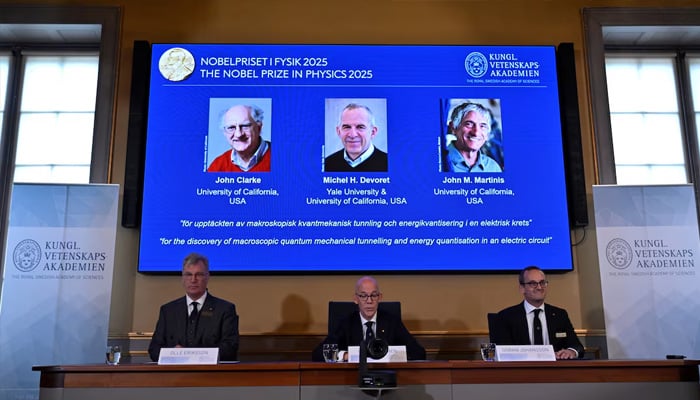Politics
Trio win Nobel prize for revealing quantum physics in action

US-based scientists John Clarke, Michel Devoret and John Martinis won the 2025 Nobel Prize in Physics for “experiments that revealed quantum physics in action”, paving the way for the development of the next generation of digital technologies.
“My feelings are that I’m completely stunned. Of course it had never occurred to me in any way that this might be the basis of a Nobel Prize,” Clarke told the Nobel press conference by telephone on Tuesday.
“I’m speaking on my cell phone and I suspect that you are too, and one of the underlying reasons that the cell phone works is because of all this work.”
‘New surprises’ in century-old field of quantum mechanics
Quantum mechanical behaviours are well studied at the level of the incredibly small — atoms and sub-atomic particles — but are often seen as bizarre and unintuitive compared with classical physics and its far larger scale.
The Nobel winners carried out experiments in the mid-1980s with an electronic circuit built of superconductors and demonstrated that quantum mechanics could also influence everyday objects under certain conditions.
“It is wonderful to be able to celebrate the way that century-old quantum mechanics continually offers new surprises. It is also enormously useful, as quantum mechanics is the foundation of all digital technology,” Olle Eriksson, chair of the Nobel Committee for Physics, said.
Quantum technology is already ubiquitous, with transistors in computer microchips an everyday example.
“This year’s Nobel Prize in Physics has provided opportunities for developing the next generation of quantum technology, including quantum cryptography, quantum computers, and quantum sensors,” the Royal Swedish Academy of Sciences, which awards the prize, said in a statement.
Quantum computers use principles of quantum mechanics to make complex calculations, predict outcomes and perform analysis that in some cases could take traditional computers millions of years.
The field is considered to have the potential to help solve some of humanity’s most pressing concerns, such as tackling climate change. But it also faces challenges, including improving the accuracy of its chips, and timelines for commercially viable quantum computing remain disputed.